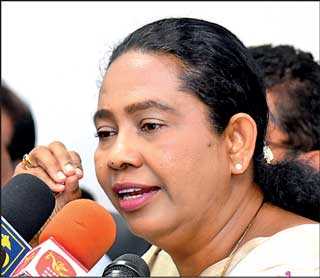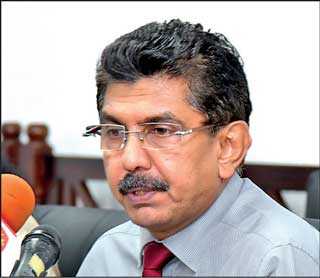Friday Feb 20, 2026
Friday Feb 20, 2026
Thursday, 12 March 2020 00:00 - - {{hitsCtrl.values.hits}}
By Shailendree Wickrama Adittiya
Health and Indigenous Medical Services Ministry yesterday defended COVID-19 quarantine efforts taken by the Government, saying that those returning from abroad must adhere to the measures taken for the safety of their families as well as fellow citizens of the country.
 |
Health and Indigenous Medical Services Minister Pavithra Wanniarachchi |
 |
Health Services Director General
|
Criticism of the quarantine measures as well as the facilities provided were shared on social media, with the quarantining of a group of Sri Lankans returning from Italy on Tuesday.
Addressing the media, Health and Indigenous Medical Services Minister Pavithra Wanniarachchi said there was no truth to these reports and asked that fake news is not circulated online. She added that controlling the virus if it spreads in the country would be an extremely difficult task and that the public should cooperate with the Government’s quarantine measures.
“Perhaps those returning to the country are unaware of the risks involved in this situation or maybe it is selfishness, but as the Health Minister of this country, I have a responsibility, especially to those residing in the country, to protect them and prevent this disease from spreading,” she said.
Wanniarachchi added that a request was being made to the public to assist with all efforts to control the spread of COVID-19 in Sri Lanka, especially the 14-day quarantine process. “If certain issues crop up in this process, we are ready to offer fair solutions for them,” she said, adding that a group that returned from Italy on Tuesday had protested against being quarantined.
She further commented that the Ministry announced the quarantine process for those arriving from Italy, South Korea, and Iran a week ago and those who protested against the measures returned to the country well aware of the precautionary measures.
Health Services Direct General Dr. Anil Jasinghe emphasised the need for public assistance and cooperation when managing quarantine centres. He explained that refusing to be quarantined can put an individual’s elderly family members at risk of contracting the virus.
There are currently 570 individuals under observation at quarantine centres and the individuals are taken to the centres in luxury buses. The quarantine centres are in Batticaloa and Hendala, with additional facilities in Diyathalawa. In addition to this, as per directions of the President, the Sri Lanka Army is prepared to set up more centres if there is a need to do so.
“They are monitored by the military but that is a basic kind of monitoring,” Dr. Jasinghe said, explaining that military doctors supervise the quarantine centres. “They are the best to run this kind of set-up,” he added.
There was no need for doctors at the quarantine centres, he said, as those being quarantined are not patients but healthy individuals.
“From the Health Ministry, we have placed an ambulance and an ECG machine so, in case somebody gets chest pains, they don’t need to be taken to a hospital,” he said, adding that checking for symptoms takes place twice a day.
In addition to the quarantine centres and patients under observation at hospitals, 4,443 individuals are being monitored at their residences. Currently, monitoring is only taking place with Chinese nationals in Sri Lanka as those returning from other countries are being quarantined.
Regarding the first local citizen to test positive in Sri Lanka, Dr. Jasinghe said he was a 52-year-old male tour guide who had travelled to various parts of the country with a group from Italy. While the patient is currently at the Infectious Diseases Hospital (IDH), his family is under home-quarantine. While he is from the Colombo District, Dr. Jasinghe said further details cannot be given as local communities may react badly to the situation.
The group from Italy has already left the country but health officials have been tracking and monitoring all those he made contact with as well as those the tour group made contact with and the places they visited.
With the first local citizen to test positive for COVID-19, Dr. Jasinghe said measures to prevent the spread of the virus in Sri Lanka has moved from the first stage to include steps from the second. “The first thing we must do is to prevent the virus from being carried into the country and the second is to prevent the spread of the virus within the country,” he said, adding that the third stage is treatment and the fourth is what should be done if the virus starts spreading rapidly.
In response to a question on further measures to be taken, Wanniarachchi said no decisions have been made regarding public gathering, especially with the upcoming festival season, but that limitations would be made if the situation in the country worsens.
While the Government made a decision to stop Buddhist pilgrimages to India, Dr. Jasinghe requested the public to avoid all other pilgrimages as well as group holidays abroad.
The National Action Committee appointed to prevent the spread of COVID-19 met yesterday morning for a lengthy discussion on further measures to be taken and the Committee met with President Gotabaya Rajapaksa and Prime Minister Mahinda Rajapaksa last evening.
Pix by Ruwan Walpola